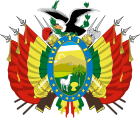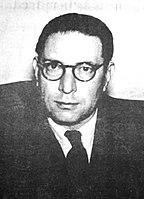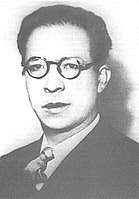Cabinet of Germán Busch
Busch cabinet | |
|---|---|
98th–100th Cabinet of the Republic of Bolivia | |
| 1937–1939 | |
 | |
| Date formed | 13 July 1937 |
| Date dissolved | 23 August 1939 |
| People and organisations | |
| President | Germán Busch |
| Vice President | Vacant (1937–1938) Enrique Baldivieso (1938–1939) Vacant |
| No. of ministers | 11 (on 23 August 1939) |
| Total no. of members | 25 (including former members) |
| Member parties | United Socialist Party (PSU) Socialist Republican Party (PRS) |
| Status in legislature | Majority government |
| History | |
| Legislature term | 1938–1939 |
| Predecessor | Cabinet of David Toro |
| Successor | Cabinet of Carlos Quintanilla (interim) |
 |
|---|
|
|
Germán Busch assumed office as the 36th President of Bolivia on 13 July 1937, and his term was cut short by his death on 23 August 1939. A young military officer during the Chaco War, Busch attempted to champion the cause of Military Socialism brought forth by his predecessor David Toro but, unhappy with the results produced by his few reforms, opted to declare himself dictator in April 1939 before committing suicide four months later.
Busch formed three cabinets during his 25-month presidency, constituting the 98th to 100th national cabinets of Bolivia as part of the 1936–1938 Government Junta.[1][2]
Cabinet Ministers
Cabinet of Bolivia Presidency of Germán Busch, 1937–1939 | |||||||||
|---|---|---|---|---|---|---|---|---|---|
| Office | Minister | Party | Prof. | Term | Days | N.C[a] | P.C[b] | ||
| President | Germán Busch | Mil-Soc. | Mil. | 13 July 1937 – 23 August 1939 | 771 | – | – | ||
| Vice President | Office vacant 13 July 1937 – 28 May 1938 | ||||||||
| Enrique Baldivieso | PSU | Law. | 28 May 1938 – 24 April 1939 | 331 | |||||
| Office vacant 24 April 1939 – 23 August 1939 | |||||||||
| Secretary-General of the Junta | Gabriel Gosálvez | PSU | Eco. | 13 July 1937 – 12 August 1938 | 395 | 98 | 1 | ||
| Office discontinued from 12 August 1938 | |||||||||
| Minister of Foreign Affairs and Worship (Chancellor) |
Minister of Propaganda |
Enrique Baldivieso[3] | PSU | Law. | 13 July 1937 – 14 December 1937 | 154 | 98 | 1 | |
| Eduardo Díez de Medina | – | Law. | 14 December 1937 – 23 August 1939 | 617 | 99 | 2 | |||
| – | 100 | 3 | |||||||
| Minister of Government and Justice |
– | Félix Tabera | Mil-Soc. | Mil. | 13 July 1937 – 19 July 1937 | 6 | 98 | 1 | |
| César B. Menacho | Mil-Soc. | Mil. | 19 July 1937 – 12 August 1938 | 389 | |||||
| 99 | 2 | ||||||||
| Minister of Propaganda |
Gabriel Gosálvez[c] | PSU | Eco. | 12 August 1938 – 18 March 1939 | 218 | 100 | 3 | ||
| Vicente Leyton | – | Law. | 18 March 1939 – 15 April 1940 | 394 | 3[d] | ||||
| Minister of National Defense | Secundino Olmos | Mil-Soc. | Mil. | 13 July 1937 – 12 August 1938 | 395 | 98 | 1 | ||
| 99 | 2 | ||||||||
| Felipe Manuel Rivera | Mil-Soc. | Mil. | 12 August 1938 – 23 August 1939 | 376 | 100 | 3 | |||
| Minister of Finance and Statistics |
Federico Gutiérrez Granier | PL | – | 13 July 1937 – 23 November 1937 | 133 | 98 | 1 | ||
| Eduardo Belmont Baldivia | – | Law. | 23 November 1937 – 12 August 1938 | 262 | 99 | 2 | |||
| Vicente Mendoza López | Ind. | Eco. | 12 August 1938 – 31 March 1939 | 231 | 100 | 3 | |||
| Santiago Schulze Arana | – | Eco. | 31 March 1939 – 23 August 1939 | 145 | |||||
| Minister of Industry and Commerce |
Angel Ayoroa | Mil-Soc. | Mil. | 13 July 1937 – 23 November 1937 | 133 | 98 | 1 | ||
| Alfredo Peñaranda | Mil-Soc. | Mil. | 23 November 1937 – 12 August 1938 | 262 | 99 | 2 | |||
| Vicente Leyton | – | Law. | 12 August 1938 – 18 March 1939 | 218 | 100 | 3 | |||
| Luis Herrero | – | – | 18 March 1939 – 23 August 1939 | 158 | |||||
| Minister of Development | Minister of Communications |
Luis Campero | Mil-Soc. | Mil. | 13 July 1937 – 12 August 1938 | 395 | 98 | 1 | |
| 99 | 2 | ||||||||
| Minister of Public Works | Walter Méndez | Mil-Soc. | Mil. | 12 August 1938 – 23 August 1939 | 376 | 100 | 3 | ||
| Minister of Mining and Petrol |
Felipe Manuel Rivera | Mil-Soc. | Mil. | 13 July 1937 – 12 August 1938 | 395 | 98 | 1 | ||
| 99 | 2 | ||||||||
| Dionisio Foianini[e] | – | Bus. | 12 August 1938 – 23 August 1939 | 376 | 100 | 3 | |||
| Minister of Work and Social Security |
– | Daniel Sossa | Mil-Soc. | Mil. | 13 July 1937 – 12 August 1938 | 395 | 98 | 1 | |
| 99 | 2 | ||||||||
| Minister of Sanitation |
Alberto Zelada | Mil-Soc. | Mil. | 12 August 1938 – 20 March 1939 | 220 | 100 | 3 | ||
| Roberto Jordán Cuéllar | PSU | – | 20 March 1939 – 23 August 1939 | 156 | |||||
| Minister of Health and Hygiene | Office blank 13 July 1937 – 22 August 1938 | ||||||||
| Alfredo Mollinedo | PSU | Dr. | 22 August 1938 – 15 April 1940 | 602 | 100 | 3[d] | |||
| Minister of Education and Indigenous Affairs |
Alfredo Peñaranda | Mil-Soc. | Mil. | 12 October 1936 – 23 November 1937 | 133 | 97[f] | 1[g] | ||
| Héctor Ormachea Zalles | – | Law. | 23 November 1937 – 12 August 1938 | 262 | 99 | 2 | |||
| Bernardo Navajas Trigo | PL | Law. | 12 August 1938 – 15 April 1940 | 977 | 100 | 3[d] | |||
| Minister of Agriculture, Colonization, and Immigration |
César B. Menacho | Mil-Soc. | Mil. | 13 July 1937 – 19 July 1937 | 6 | 98 | 1 | ||
| Walter Méndez | Mil-Soc. | Mil. | 19 July 1937 – 12 August 1938 | 389 | |||||
| 99 | 2 | ||||||||
| Julio Salmón[h] | PL | Law. | 12 August 1938 – 23 August 1939 | 376 | 100 | 3 | |||
Composition
First cabinet

Having secured the resignation of President David Toro on 13 July 1937, Germán Busch entered the Palacio Quemado and established his first cabinet. The government was a mixture of leftist military officers and members of the United Socialist Party (PSU) which had collaborated with the Toro regime.[7]
The Council of Ministers formed by Germán Busch indicated a continued struggle his regime faced in pinpointing a clear ideology.[8] Politically, Busch appointed ministers generally in line with the moderate socialism of Toro, choosing the head of the PSU Enrique Baldivieso as foreign minister and the moderate socialist Gabriel Gosálvez as secretary-general. However, at the same time, he appointed such figures as the right-wing Federico Gutiérrez Granier in the crucial office of Minister of Finance, a position the Liberal politician would use to undo many of the consumer goods subsidies of the Toro regime. Minister of Agriculture Julio Salmón and Minister of Education Bernardo Navajas Trigo were also Liberals.
Second cabinet
The cabinet was renewed on 23 November 1937. Three ministerial positions were changed: Federico Gutiérrez Granier with Eduardo Belmont Baldivia as Minister of Finance, Angel Ayoroa with Alfredo Peñaranda as Minister of Industry, with Peñaranda's former position as Minister of Education being filled by Héctor Ormachea Zalles. The following month on 14 December, Foreign Minister Enrique Baldivieso was exchanged with Eduardo Díez de Medina who had served in the position once before.[9]
During this period starting on 23 May, the National Convention of 1938 would be held and charged with rewriting the constitution.[10] On 27 May, the National Convention would proclaim Busch constitutional president with Enrique Baldivieso as vice president.[11]
Third cabinet
Busch's third cabinet was formed on 12 August 1938.[12] Gabriel Gosálvez would be appointed Minister of Government and Justice as well as Propaganda which had previously been under the purview of the Foreign Ministry. No Secretary-General was appointed to replace him. Multiple health related ministries would be established as part of this cabinet. Upon the formation of the cabinet on 12 August, the new Minister of Labor Alberto Zelada would also be appointed to the position of Minister of Sanitation. Ten days later on 22 August, a dedicated Ministry of Health and Hygiene would be established with Alfredo Mollinedo appointed to head the position.[13]
On 30 October, the National Convention would promulgate the new constitution.[14] While the constitution would remain in effect until 1945, Busch would dismiss the national assembly on 24 April 1939 and declare himself dictator.[15] Busch's presidency would come to an end four months later when he committed suicide. General Carlos Quintanilla would take hold of the presidency in the interim period and the majority of the Busch cabinet, save for Alfredo Mollinedo, Bernardo Navjas Trigo, Vicente Leyton, and Felipe Manuel Rivera, would be dismissed.
Established Ministries
- Office of Sanitation (under Work and Social Security): Alberto Zelada, first holder from 12 August 1938[12]
- Ministry of Health and Hygiene: Alfredo Mollinedo (PSU), first holder from 22 August 1938[13]
Gallery
- Felipe Manuel Rivera – Minister of National Defense and Minister of Mining
- Vicente Mendoza López – Minister of Finance
- Angel Ayoroa – Minister of Industry
- Héctor Ormachea Zalles – Minister of Education
- Bernardo Navajas Trigo – Minister of Education (PL)
- Daniel Sossa – Minister of Work
Notes
- ^ Denoting which national cabinet the minister was originally a part of.
- ^ Denoting which presidential cabinet the minister was originally a part of.
- ^ Acting Foreign Minister in the absence of Enrique Baldivieso from 13 July to 25 July 1937 and in the absence of Eduardo Díez de Medina from 30 November to 30 December 1938.[4]
- ^ a b c Held over into the Quintanilla cabinet.
- ^ Acting Foreign Minister in the absence of Eduardo Díez de Medina from 22 May to 19 July 1939.[5]
- ^ Originally a member of the 97th national cabinet of Bolivia.
- ^ Originally a member of the Toro ministerial cabinet.
- ^ Acting Foreign Minister in the absence of Eduardo Díez de Medina from 3 June to 20 June 1938.[6]
References
- ^ Gisbert 2003, pp. 342–344
- ^ "DECRETO SUPREMO No 19-07-1937 del 19 de Julio de 1937 » Derechoteca.com". www.derechoteca.com. Retrieved 3 February 2021.
- ^ "canciller". archive.vn. 19 February 2013. Archived from the original on 19 February 2013. Retrieved 17 February 2021.
- ^ "canciller". archive.vn. 19 February 2013. Archived from the original on 19 February 2013. Retrieved 17 February 2021.
- ^ "canciller". archive.vn. 19 February 2013. Archived from the original on 19 February 2013. Retrieved 17 February 2021.
- ^ "canciller". archive.vn. 19 February 2013. Archived from the original on 19 February 2013. Retrieved 17 February 2021.
- ^ Political handbook of the world 1940. New York, 1940. P. 12.
- ^ Klein, Herbert S. (May 1967). "Germán Busch and the Era of "Military Socialism" in Bolivia". The Hispanic American Historical Review. XLVII (2): 166–184. doi:10.1215/00182168-47.2.166.
- ^ "DECRETO 14-12-1937 del 14 de Diciembre de 1937 – 1 » Derechoteca.com". www.derechoteca.com. Retrieved 26 January 2021.
- ^ Rossana Barragán, "Ciudadanía y elecciones, convenciones y debates" in Barragán R., Rossana; José Luis Roca (2005). Regiones y poder constituyente en Bolivia : una historia de pactos y disputas. Cuaderno de futuro, 21. La Paz, Bolivia: PNUD. p. 336. ISBN 978-99905-0-960-1.
- ^ "Bolivia: Ley de 27 de mayo de 1938". www.lexivox.org. Retrieved 26 January 2021.
- ^ a b "DECRETO SUPREMO No 12-08-1938 del 12 de Agosto de 1938 » Derechoteca.com". www.derechoteca.com. Retrieved 26 January 2021.
- ^ a b "DECRETO SUPREMO del 22 de Agosto de 1938 – 1 » Derechoteca.com". www.derechoteca.com. Retrieved 26 January 2021.
- ^ "Bolivia: Constitución política de 1938, 30 de octubre de 1938". www.lexivox.org. Retrieved 26 January 2021.
- ^ "DECRETO SUPREMO del 24 de Abril de 1939 – 1 » Derechoteca.com". www.derechoteca.com. Retrieved 26 January 2021.
Bibliography
- Gisbert, Carlos D. Mesa (2003). Presidentes de Bolivia: entre urnas y fusiles : el poder ejecutivo, los ministros de estado (in Spanish). Editorial Gisbert. pp. 342–344.













